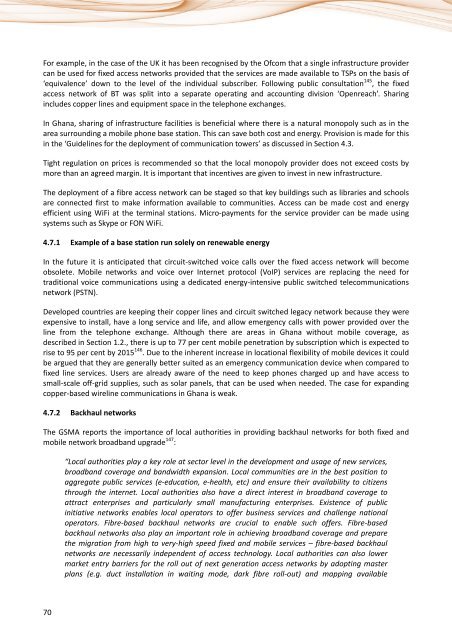Information and communication technologies (ICTs) and ... - ITU
Information and communication technologies (ICTs) and ... - ITU
Information and communication technologies (ICTs) and ... - ITU
Create successful ePaper yourself
Turn your PDF publications into a flip-book with our unique Google optimized e-Paper software.
For example, in the case of the UK it has been recognised by the Ofcom that a single infrastructure provider<br />
can be used for fixed access networks provided that the services are made available to TSPs on the basis of<br />
‘equivalence’ down to the level of the individual subscriber. Following public consultation 145 , the fixed<br />
access network of BT was split into a separate operating <strong>and</strong> accounting division ‘Openreach’. Sharing<br />
includes copper lines <strong>and</strong> equipment space in the telephone exchanges.<br />
In Ghana, sharing of infrastructure facilities is beneficial where there is a natural monopoly such as in the<br />
area surrounding a mobile phone base station. This can save both cost <strong>and</strong> energy. Provision is made for this<br />
in the ‘Guidelines for the deployment of <strong>communication</strong> towers’ as discussed in Section 4.3.<br />
Tight regulation on prices is recommended so that the local monopoly provider does not exceed costs by<br />
more than an agreed margin. It is important that incentives are given to invest in new infrastructure.<br />
The deployment of a fibre access network can be staged so that key buildings such as libraries <strong>and</strong> schools<br />
are connected first to make information available to communities. Access can be made cost <strong>and</strong> energy<br />
efficient using WiFi at the terminal stations. Micro-payments for the service provider can be made using<br />
systems such as Skype or FON WiFi.<br />
4.7.1 Example of a base station run solely on renewable energy<br />
In the future it is anticipated that circuit-switched voice calls over the fixed access network will become<br />
obsolete. Mobile networks <strong>and</strong> voice over Internet protocol (VoIP) services are replacing the need for<br />
traditional voice <strong>communication</strong>s using a dedicated energy-intensive public switched tele<strong>communication</strong>s<br />
network (PSTN).<br />
Developed countries are keeping their copper lines <strong>and</strong> circuit switched legacy network because they were<br />
expensive to install, have a long service <strong>and</strong> life, <strong>and</strong> allow emergency calls with power provided over the<br />
line from the telephone exchange. Although there are areas in Ghana without mobile coverage, as<br />
described in Section 1.2., there is up to 77 per cent mobile penetration by subscription which is expected to<br />
rise to 95 per cent by 2015 146 . Due to the inherent increase in locational flexibility of mobile devices it could<br />
be argued that they are generally better suited as an emergency <strong>communication</strong> device when compared to<br />
fixed line services. Users are already aware of the need to keep phones charged up <strong>and</strong> have access to<br />
small-scale off-grid supplies, such as solar panels, that can be used when needed. The case for exp<strong>and</strong>ing<br />
copper-based wireline <strong>communication</strong>s in Ghana is weak.<br />
4.7.2 Backhaul networks<br />
The GSMA reports the importance of local authorities in providing backhaul networks for both fixed <strong>and</strong><br />
mobile network broadb<strong>and</strong> upgrade 147 :<br />
“Local authorities play a key role at sector level in the development <strong>and</strong> usage of new services,<br />
broadb<strong>and</strong> coverage <strong>and</strong> b<strong>and</strong>width expansion. Local communities are in the best position to<br />
aggregate public services (e-education, e-health, etc) <strong>and</strong> ensure their availability to citizens<br />
through the internet. Local authorities also have a direct interest in broadb<strong>and</strong> coverage to<br />
attract enterprises <strong>and</strong> particularly small manufacturing enterprises. Existence of public<br />
initiative networks enables local operators to offer business services <strong>and</strong> challenge national<br />
operators. Fibre-based backhaul networks are crucial to enable such offers. Fibre-based<br />
backhaul networks also play an important role in achieving broadb<strong>and</strong> coverage <strong>and</strong> prepare<br />
the migration from high to very-high speed fixed <strong>and</strong> mobile services – fibre-based backhaul<br />
networks are necessarily independent of access technology. Local authorities can also lower<br />
market entry barriers for the roll out of next generation access networks by adopting master<br />
plans (e.g. duct installation in waiting mode, dark fibre roll-out) <strong>and</strong> mapping available<br />
70

















